CHAPTER I - GENERAL PROVISIONS
Article 1. Scope of regulation and subjects of application
1. This regulation stipulates the control of power and the prevention and combating of corruption and negative practices in investigation, prosecution, trial (hereinafter referred to as litigation activities), execution of judgments, and other activities related to investigation, prosecution, trial, and execution of judgments (hereinafter referred to as other related activities).
2. This regulation applies to Party committees, Party organizations, Party members, agencies, organizations, and individuals with authority (collectively referred to as agencies, organizations, and individuals with authority) in leading, directing, and implementing litigation, enforcement of judgments, and other related activities as prescribed by the Party and the laws of the State.
Overview of the closing session of the 8th Central Committee Meeting of the 13th Party Congress, morning of October 8, 2023. Photo: Phuong Hoa/VNA
Article 2. Definitions
In this Regulation, the following terms are understood as follows:
1. Judicial and enforcement activities include: Receiving and handling information about crimes; initiating, investigating, prosecuting, and adjudicating criminal cases; resolving administrative cases, civil cases, and bankruptcy cases; reviewing and deciding on the application of administrative sanctions in court; and enforcing judgments and decisions of the court in accordance with the provisions of criminal, administrative, civil, bankruptcy, administrative violation handling, and enforcement laws.
2. Other activities related to litigation and enforcement (related activities) include: property appraisal and valuation; bidding and auction; notarization and certification; interpretation and translation; defense, legal aid, protection of the legal rights and interests of victims and parties involved; mediation and dialogue in court; bailiff services, coordination of enforcement of judgments, consideration of pardons; judicial assistance and other international cooperation; resolving petitions, complaints, and denunciations; protecting whistleblowers, witnesses, victims, and other participants in litigation.
3. Power in litigation and enforcement activities refers to the authority of agencies, organizations, and individuals in leading, directing, and carrying out litigation, enforcement, and other related activities as prescribed by the Party and the laws of the State.
4. Abusing one's position and authority in litigation and enforcement activities refers to the act of an agency, organization, or person with authority in leading, directing, and carrying out litigation, enforcement, and other related activities for personal gain or other personal motives, who abuses their assigned position and authority to act contrary to official duties (performing duties or tasks not as assigned) in leading, directing, and carrying out litigation, enforcement, and other related activities.
5. Abuse of position and authority in litigation and enforcement activities refers to the act of an agency, organization, or person with authority in leading, directing, and carrying out litigation, enforcement, and other related activities for personal gain or other personal motives, using their position and authority to do things beyond the scope of their assigned position and authority.
6. Abuse of power in litigation and enforcement activities refers to the act of an agency, organization, or person with authority in leading, directing, and carrying out litigation, enforcement, and other related activities for personal gain or other personal motives, exceeding their assigned authority, or acting contrary to official duties in leading, directing, and carrying out litigation, enforcement, and other related activities.
7. Corruption in litigation and enforcement activities refers to the act of individuals holding positions of authority in leadership, direction, and implementation of litigation, enforcement, and other related activities who exploit or abuse their position and authority for personal gain.
8. Negative aspects in litigation and enforcement activities include acts of ideological and political degradation, moral decay, violations of regulations, rules, professional procedures, ethical standards, codes of conduct, and failure to properly implement the Party's policies and regulations, and the laws of the State.
9. Controlling power and preventing and combating corruption and negative practices in litigation and enforcement activities involves using mechanisms and measures to ensure the strict implementation of the Party's guidelines and regulations, the State's laws, working principles and regulations, professional procedures, ethical standards, and codes of conduct; preventing, detecting, and stopping violations, abuse of power, misuse of authority, corruption, and negative practices in litigation, enforcement, and other related activities.
10. Family members include spouse; biological parents, adoptive parents, and guardians; biological parents, adoptive parents, and guardians of the spouse; biological children, adopted children, daughters-in-law, and sons-in-law; siblings; and siblings of the spouse.
11. Relatives include family members; paternal and maternal grandparents; great-grandparents; uncles, aunts, and nephews/nieces.
Article 3. Principles of power control and prevention of corruption and negative practices in litigation and enforcement of judgments.
1. Ensuring the centralized, unified, strict, and comprehensive leadership and direction of the Party; the supervision of agencies and elected representatives, the Vietnam Fatherland Front , executive agencies, political and social organizations, and the people over litigation, enforcement of judgments, and other related activities in accordance with the Party's regulations and the State's laws.
2. Ensure that all power is strictly controlled by mechanisms and bound by responsibility; responsibility is commensurate with authority, and the higher the authority, the greater the responsibility.
3. Ensuring independence, objectivity, compliance with laws, regulations, working procedures, professional standards, ethical standards, and codes of conduct of competent agencies, organizations, and individuals in litigation, enforcement of judgments, and other related activities.
4. Ensuring openness, transparency, and accountability of agencies, organizations, and authorized individuals in litigation, enforcement of judgments, and other related activities in accordance with the Party's regulations and the State's laws.
5. Promptly detect, prevent, and strictly handle all violations, abuses of power, abuse of authority, corruption, and negative practices in litigation, enforcement of judgments, and other related activities, without exception or forbidden zones.
6. Comply with the Party's guidelines and regulations and relevant laws.
Article 4. Content of power control, prevention and combating corruption and negative practices in litigation and enforcement activities.
1. To oversee the leadership, direction, and organization of the implementation of the Party's policies and regulations, the State's laws, working regulations, professional procedures, ethical standards, codes of conduct, and the prevention and fight against corruption and negative practices in litigation, enforcement of judgments, and other related activities.
2. To oversee the performance of duties and powers of agencies, organizations, and authorized individuals in leading, directing, and carrying out litigation, enforcement of judgments, and other related activities.
Article 5. Methods of controlling power and preventing and combating corruption and negative practices in litigation and enforcement of judgments.
1. To lead, direct, and advise on the development, promulgation, and implementation of the Party's policies and regulations, the State's laws, working regulations, professional procedures, ethical standards, and codes of conduct to control power and prevent and combat corruption and negative practices in litigation, enforcement of judgments, and other related activities.
2. Leading, directing, and implementing self-criticism and criticism, exemplary conduct, transparency, accountability, and other measures to control power, prevent violations, corruption, and negative practices; handling petitions, feedback, complaints, and denunciations in litigation, enforcement, and other related activities; conducting self-inspections, detecting, preventing, and handling violations, corruption, and negative practices within the agencies and organizations authorized to conduct litigation, enforcement, and other related activities.
3. To lead, direct, and guide the activities of competent agencies and organizations conducting litigation, enforcing judgments, and other related activities in accordance with the Party's regulations and the State's laws; to build and strengthen the organizational structure and the staff of cadres, Party members, civil servants, and public employees in these agencies.
4. Inspect, supervise, audit, and oversee the performance of duties and powers; the adherence to the Party's guidelines and regulations, the State's laws, working regulations, professional procedures, ethical standards, and codes of conduct; the handling of petitions, feedback, complaints, and denunciations; and the implementation of measures to prevent, deter, and address violations, abuse of power, corruption, and negative practices in litigation, enforcement of judgments, and other related activities as prescribed by the Party and the State's laws.
5. To lead and direct the handling of cases and incidents in accordance with the Party's regulations and the State's laws. To request inspections, audits, and reviews of decisions made by competent agencies, organizations, and individuals in litigation, enforcement of judgments, and other related activities in accordance with the Party's regulations and the State's laws.
CHAPTER II - CONTROLLING POWER, PREVENTING AND COMBATING CORRUPTION AND NEGATIVE PRACTICES IN LITIGATION AND ENFORCEMENT OF JUDGMENTS
Article 6. Acts of exploiting or abusing official positions and powers, abuse of authority, corruption, and misconduct in litigation and enforcement activities.
1. Leading, directing, advising, and issuing documents that contradict the Party's policies and regulations, and the State's laws in litigation, enforcement of judgments, and other related activities.
2. Failure to implement, or implementing incorrectly or incompletely, the Party's policies and regulations, the State's laws, working regulations, professional procedures, ethical standards, codes of conduct, duties, and official functions in litigation, enforcement of judgments, and other related activities.
3. Lack of responsibility, lax leadership and management leading to violations, abuse of power, misuse of authority, corruption, and negative practices in litigation, enforcement of judgments, and other related activities.
4. Covering up, condoning, assisting, or improperly handling violations, abuse of position and authority, corruption, and negative practices in litigation, enforcement of judgments, and other related activities.
5. Interfering with, obstructing, or influencing, in violation of Party regulations and State laws, the activities of litigation, enforcement of judgments, and other related activities; the inspection, supervision, investigation, and auditing activities of Party committees, Party organizations, advisory and support agencies of the Party, and functional agencies; and the supervisory activities of elected bodies and representatives, the Fatherland Front, political and social organizations, and the people regarding litigation, enforcement of judgments, and other related activities.
6. Directing or coercing subordinates to conceal, fail to report, report falsely, or fail to implement or implement incorrectly regulations and operational procedures, leading to inaccurate results in handling and resolving information about crimes, initiating prosecutions, investigating, prosecuting, adjudicating, executing judgments, and other related activities.
7. Deliberately failing to receive, process, or receiving and processing information about crimes, administrative lawsuits, civil cases, requests for civil settlement, bankruptcy, and enforcement of judgments in violation of the law.
8. Concealing, falsifying, omitting, or leaking information about crimes, or falsifying records, documents, or destroying evidence illegally.
9. Issuing decisions to initiate or not initiate criminal proceedings, decisions to prosecute or not issue decisions to prosecute suspects, decisions to approve or revoke decisions to prosecute suspects unlawfully; failing to prosecute a guilty person or prosecuting an innocent person, or issuing judgments or decisions unlawfully.
10. Decisions to apply, change, or revoke preventive measures, coercive measures, judicial measures; changes to offenses, penalties, exemptions, reductions of penalties, exemptions, reductions of criminal or civil liability; temporary suspension or suspension of case resolution; transfer of cases; merging or separating cases unlawfully.
11. Torture, coercion, leading questions, or directing or organizing collusion with the accused; pressuring or suggesting to the parties involved or other participants in the proceedings to provide documents, statements, or presentations that are not objective or truthful.
12. Delaying or prolonging the time for appraisal and valuation of assets in violation of the law; intentionally avoiding or delaying the provision of documents as requested for appraisal and valuation, or providing false documents; making false conclusions in the appraisal and valuation of assets, or refusing to make conclusions in the appraisal and valuation of assets illegally.
13. Abusing the right to request expert opinions, property valuation, the right to request the provision of records and documents, or the right to return case files for further investigation, the right to annul judgments and reinvestigate, the right to appeal, review, or retrial, or the right to request clarification of judgments to prolong the process of resolving cases, matters, or enforcing judgments for personal gain.
14. Proposing or deciding to postpone or temporarily suspend the execution of prison sentences, granting exemption or reduction of prison sentences, granting conditional early release, shortening the probation period for those granted suspended sentences, or considering and proposing pardons in violation of the law.
15. Deliberately enforcing judgments contrary to the content of legally effective judgments or decisions, or failing to issue enforcement decisions, delaying or prolonging the time for resolving enforcement matters unlawfully; deciding to apply security measures, temporary emergency measures, coercive enforcement measures, colluding with valuation and auction units to restrict buyers, artificially lower prices, or devalue assets subject to enforcement unlawfully.
16. Deliberately violating regulations on sealing, unsealing, seizure of assets, freezing of accounts, and on the collection, preservation, and handling of evidence, temporarily seized assets, and assets subject to enforcement of judgments.
17. Unlawfully obstructing the activities of defense lawyers, those protecting the legal rights and interests of victims and parties involved; self-defense activities, activities involving the use of defense lawyers, protection of legal rights and interests, or the exercise of the right to complain, denounce, and other rights of victims, persons entitled to enforcement of judgments, parties involved, accused persons, persons serving sentences, and persons obligated to enforce judgments as prescribed by law.
18. Providing advice, contacting, interacting with, or resolving matters improperly regarding the regime of visits, meetings, and communication with accused persons and prisoners; causing inconvenience or harassment to accused persons, those serving sentences, those required to execute sentences, victims, those entitled to sentence execution, parties involved, or their relatives for personal gain or other personal motives.
19. Abusing work related to state secrets or confidential information for personal gain or other personal motives; directing or providing, disclosing information, files, or documents related to cases or incidents contrary to the regulations of the Party and the laws of the State.
20. Abusing one's position and authority to misappropriate property; exploiting influence over persons holding positions of authority or committing forgery in official duties to gain personal profit in litigation, enforcement of judgments, and other related activities.
21. Taking advantage of or abusing one's position and authority to impose or legitimize one's own unlawful acts or decisions, or to resolve one's personal matters in litigation, enforcement of judgments, and other related activities.
22. Receiving gifts (material or non-material benefits) in any form to violate Party regulations and State laws; giving gifts (directly or indirectly in any form) to influence or affect competent authorities in litigation, enforcement of judgments, and other related activities to distort the results of handling information about crimes, initiating prosecutions, investigating, prosecuting, adjudicating, enforcing judgments, and other related activities.
23. Intentionally allowing family members and other relatives to exploit one's position, authority, or power for personal gain or to participate in legal defense or consultation in cases or matters that one directs or directly handles.
24. Deliberately failing to address, implement, or improperly address or obstruct the resolution of petitions, feedback, complaints, denunciations, and requests in litigation, enforcement of judgments, and other related activities.
25. Disclosing information, threatening, retaliating against, or suppressing individuals who petition, report, denounce, or provide information about acts of corruption and misconduct in litigation, enforcement of judgments, and other related activities within the scope of assigned management and responsibility.
26. Threatening, retaliating against, persecuting, or bribing whistleblowers who report crimes or acts of corruption and misconduct related to oneself or family members during the process of resolving cases, incidents, or enforcing judgments.
27. Exploiting or abusing one's position and authority, or misusing power in the application of professional measures to infringe upon the legitimate rights and interests of organizations and individuals; illegally using information and documents collected from professional measures.
28. Acts of exploiting or abusing official positions and powers, abuse of authority, corruption, and other negative practices in litigation, enforcement of judgments, and other related activities as prescribed by the Party and the laws of the State.
Article 7. Responsibilities of Party committees and organizations in controlling power, preventing and combating corruption and negative practices in litigation and enforcement of judgments.
Within the scope of their assigned functions, duties, and powers, Party committees and organizations must lead and direct the implementation of the following:
1. Advise on the development, institutionalization, and strict implementation of the Party's guidelines and regulations, and the State's laws on litigation, enforcement of judgments, and other related activities; strictly implement mechanisms for controlling power and preventing and combating corruption and negative practices in litigation, enforcement of judgments, and other related activities.
2. Review, amend, supplement, improve, and strictly implement working regulations, professional procedures, ethical standards, and codes of conduct; ensure the independence, objectivity, and compliance with the law of investigators, prosecutors, judges, enforcement officers, and other authorized persons in litigation, enforcement of judgments, and other related activities.
3. Strictly implement the decisions, requests, and recommendations of competent agencies, organizations, and individuals in litigation, enforcement of judgments, and other related activities; promptly annul or amend unlawful litigation and enforcement decisions and conclusions; request, recommend, or appeal to competent agencies, organizations, and individuals to review unfounded or unlawful actions, decisions, and conclusions.
4. Receiving, resolving, and responding promptly and in accordance with regulations to requests, suggestions, feedback, reports, complaints, denunciations, and information from agencies, organizations, and individuals in litigation, enforcement of judgments, and other related activities.
5. Protect and promptly reward those who detect, report, denounce, or provide information about violations, abuse of power, misuse of authority, corruption, and negative practices in litigation, enforcement of judgments, and other related activities; strictly handle cases of exploiting the act of reporting, making suggestions, complaints, and denunciations to slander, distort, or insult the reputation of agencies, organizations, and individuals.
6. Implement self-criticism and criticism, set a good example, ensure openness, transparency, accountability, build a culture of integrity, and take other measures to prevent violations, abuse of power, misuse of authority, corruption, and negative practices in litigation, enforcement of judgments, and other related activities.
7. Inspect, supervise, audit, and examine; strengthen the role, responsibility, and effectiveness of prosecution and judicial supervision by procuratorates at all levels; strengthen and improve the effectiveness of supervision by elected agencies and representatives, the Vietnam Fatherland Front, executive agencies, political and social organizations, and the people over litigation, enforcement, and other related activities; directly inspect and supervise, promptly detect and strictly handle Party organizations, Party members, and individuals who violate, abuse their positions and powers, engage in corruption and negative practices as stipulated in Article 6 of this Regulation. Lead, direct, and create favorable conditions for the activities and strictly implement the requirements, recommendations, and conclusions of inspection, supervision, audit, and examination teams.
8. Guiding the activities of competent agencies and organizations in conducting litigation, enforcement of judgments, and other related activities; formulating policies for handling cases and incidents in accordance with Party regulations and State laws. Requesting inspections, audits, and reviews of decisions of competent agencies, organizations, and individuals in litigation, enforcement of judgments, and other related activities when there is information, requests, suggestions, complaints, or denunciations that are well-founded in accordance with Party regulations and State laws.
9. Do not engage in the acts stipulated in Article 6 of these Regulations.
Article 8. Responsibilities of members of Party committees, Party organizations, and collective leadership members of agencies and organizations with authority to conduct proceedings, enforce judgments, and other related activities.
1. To properly and fully perform the assigned duties and powers in leading, directing, and carrying out litigation, enforcement of judgments, and other related activities in accordance with the regulations of the Party and the laws of the State.
2. Exemplary in strictly implementing the Party's guidelines and regulations, the State's laws, working regulations, professional procedures, ethical standards, and codes of conduct; regulations on prohibited acts and actions for cadres, Party members, civil servants, public employees, judges, people's assessors, prosecutors, investigators, enforcement officers, supervisors, and other authorized persons in litigation, enforcement of judgments, and other related activities; the responsibility to set an example, self-criticism, criticism, maintaining moral qualities, an honest and clean lifestyle, impartiality, objectivity, and fairness in the performance of official duties, and other measures to control power and prevent corruption and negative practices.
3. Do not obstruct, influence, or unlawfully interfere with litigation, enforcement of judgments, and other related activities, as well as with inspection, supervision, investigation, and auditing activities in this field.
4. Regularly conduct self-inspections and monitoring to promptly detect, correct, and strictly handle violations, abuse of power, misuse of authority, corruption, and negative practices in litigation, enforcement of judgments, and other related activities within the scope of management and responsibility.
5. To be directly responsible for any violations, abuse of power, misuse of authority, corruption, or negative behavior occurring within the unit under their direct management and supervision.
6. Be responsible as a collective member of the Party committee, Party organization, leader of the agency or organization, and as a manager or person in charge of the field for violations, abuse of power, misuse of authority, corruption, and negative behaviors within the Party committee, Party organization, agency, organization, and in the field assigned to manage or be in charge of.
7. Do not engage in the acts stipulated in Article 6 of these Regulations.
Article 9. Responsibilities of the heads of Party committees, Party organizations, agencies, and organizations with authority to conduct proceedings, enforce judgments, and other related activities.
1. Lead, direct, and fulfill the responsibilities stipulated in Article 7 of these Regulations; and at the same time, strictly fulfill the responsibilities stipulated in Clauses 1, 2, 3, 4, and 7 of Article 8 of these Regulations.
2. To be responsible as the head for violations, abuse of power, misuse of authority, corruption, and negative practices within the Party committee, Party organization, agency, or organization under their management and supervision; to be jointly responsible if they have delegated direct management and supervision to a deputy or member of the Party committee, Party organization, agency, or organization; and to be directly responsible for violations, abuse of power, misuse of authority, corruption, and negative practices occurring within the unit under their direct management and supervision.
Article 10. Responsibilities of competent authorities in litigation, enforcement of judgments, and other related activities.
1. Fulfill the responsibilities stipulated in Clauses 1, 2, 3, and 7 of Article 8; and, depending on the position held, fulfill the responsibilities stipulated in Clauses 4, 5, and 6 of Article 8 of these Regulations.
2. Be accountable before the law and the Party committee, Party organization, and leadership of the agency, organization, or unit for your actions and decisions. Proactively refuse to participate in legal proceedings, enforcement of judgments, and other related activities in cases stipulated by procedural law, enforcement law, and other relevant laws.
3. Comply with assignments, directives, inspections, supervision, audits, and inspections by Party committees, Party organizations, agencies, organizations, units, leadership teams, and authorized heads; strictly adhere to the regulations on information and reporting on work.
CHAPTER III - HANDLING VIOLATIONS
Article 11. Handling of violations, abuse of position and power, abuse of authority, corruption, and negative practices.
1. Organizations and individuals who violate, exploit, or abuse their positions and powers, engage in corruption, or commit negative acts in litigation, enforcement of judgments, and other related activities must be severely punished in accordance with the regulations of the Party, the laws of the State, and the regulations of the agency, organization, or unit.
For violations, abuse of power, misuse of authority, corruption, and negative behaviors for which there are no regulations on handling, the Party Charter and regulations, the laws of the State, and the charters and regulations of mass organizations shall be used as a basis for appropriate handling.
In cases where disciplinary action has been taken, but it is deemed necessary, the competent authority must resolutely transfer the offender from their current position, replace them, dismiss them, remove them from office, accept their resignation, and not assign them to work related to litigation, enforcement of judgments, and other related activities; revoke and not reappoint them to judicial, auxiliary judicial, and other positions in agencies and organizations involved in litigation and enforcement of judgments.
2. In cases where violations warrant criminal prosecution, the case file must be transferred to the competent authority for handling in accordance with the law; it is strictly prohibited to retain the case for internal processing.
Article 12. Handling of responsibility for violations, abuse of position and authority, abuse of power, corruption, and negative practices.
1. For organizations:
Party committees and organizations that allow violations, abuse of power, misuse of authority, corruption, and negative practices within their scope of responsibility and leadership shall be dealt with according to Party regulations.
2. For leaders of Party committees, Party organizations, agencies, organizations, and units:
- Heads, members of Party committees, Party organizations, and members of collective leadership of agencies, organizations, and units who allow violations, abuse of power, misuse of authority, corruption, or negative practices to occur in litigation, enforcement of judgments, and other related activities within their assigned areas of direct management and responsibility shall be dealt with according to the regulations of the Party, the laws of the State, and the regulations of the agency, organization, or unit.
- Increased responsibility will be considered in cases where violations, abuse of power, misuse of authority, corruption, or negative behavior are detected, but necessary measures within the scope of authority are not applied to promptly prevent, handle, or remedy the consequences of the violations, or if reports are not promptly submitted as required by the Party and the laws of the State.
- Exclusion from liability may be considered in cases where it was impossible to know or where necessary measures within one's authority have been taken to prevent or deter violations, abuse of position and power, corruption, and misconduct in litigation, enforcement of judgments, and other related activities.
- Exemption or reduction of liability may be considered in cases where the individual proactively detects and has applied necessary measures within their authority to prevent, handle, and remedy the consequences of violations, abuse of power, abuse of authority, corruption, or negative behavior, or reports to the competent authority for handling and remedying the consequences; or in cases where there is evidence to prove that they disagree with resolutions, decisions, conclusions, or orders that violate the Party's regulations, the State's laws, or those of the collective or the head of the Party committee, Party organization, agency, organization, or unit.
- Disciplinary action may be waived or reduced if the individual proactively resigns from their position, resigns, or requests leave of absence before the competent authority discovers and handles the matter, except in cases where criminal liability is pursued.
CHAPTER IV - IMPLEMENTATION PROVISIONS
Article 13. Implementation
1. The Central Military Commission, the Central Public Security Party Committee, the Party Committee of the Supreme People's Court, the Party Committee of the Supreme People's Procuracy , the Party Committee of the Ministry of Justice, the Party Group of the Vietnam Bar Association, the Party Group of the Vietnam Lawyers Association, the provincial and city Party committees directly under the Central Committee, and other relevant Party committees and organizations shall lead and direct the thorough understanding, concretization, and serious and effective implementation of this Regulation.
2. The Party Committee of the National Assembly, the Party Committee of the Government, the Party Committee of the Supreme People's Court, the Party Committee of the Supreme People's Procuracy, and relevant Party committees and organizations shall lead and direct the review, amendment, supplementation, and promulgation of legal documents related to litigation, enforcement of judgments, and other related activities, ensuring strictness, consistency, and uniformity with this Regulation, and preventing loopholes that could be exploited, abuse of power, corruption, and negative practices.
3. The Central Inspection Commission, the Party Caucus of the National Assembly, the Party Committee of the Government, the Party Committee of the Government Inspectorate, the Party Committee of the State Audit Office, and the Party Caucus of the Vietnam Fatherland Front shall lead and direct the review, amendment, and improvement of the effectiveness of the inspection and supervision mechanisms of the Party, inspection, auditing, and supervision by agencies and elected representatives, the Fatherland Front, political and social organizations, the people, and executive agencies regarding litigation, enforcement of judgments, and other related activities.
4. The Central Internal Affairs Commission shall preside over and coordinate with the Central Inspection Commission and relevant Party committees and organizations at all levels to monitor, urge, inspect, and supervise the implementation of this Regulation; periodically conduct preliminary and final reviews and report to the Politburo and the Secretariat.
Article 14. Effective Date
This regulation takes effect from the date of signing. During implementation, if any difficulties arise or amendments or additions are needed, a report should be submitted to the Politburo (through the Central Internal Affairs Commission) for consideration and decision.
According to VNA/Tin Tuc Newspaper
Source


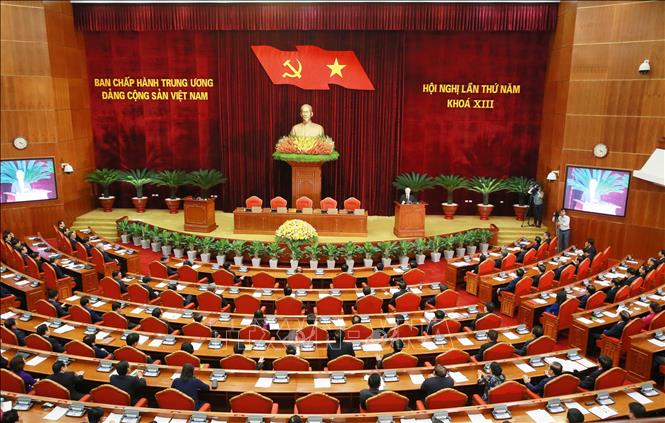






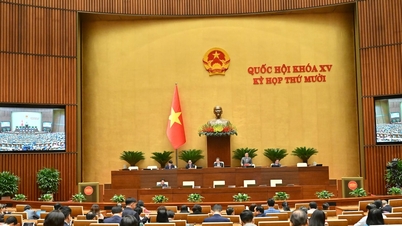





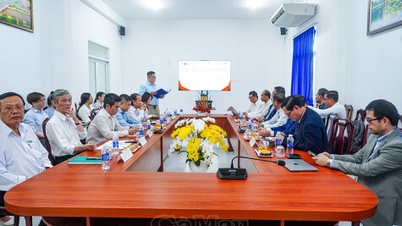

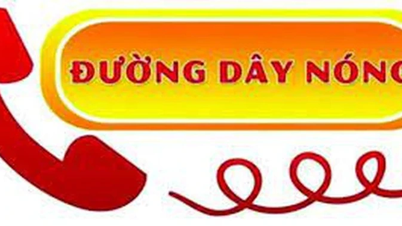



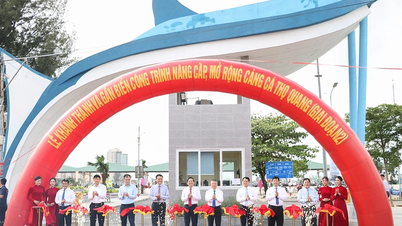





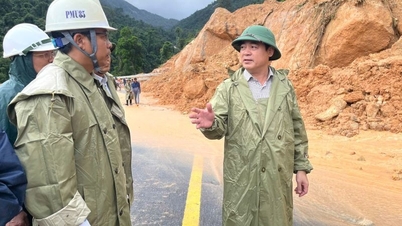







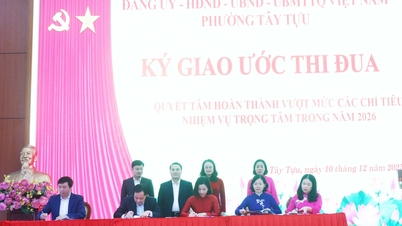
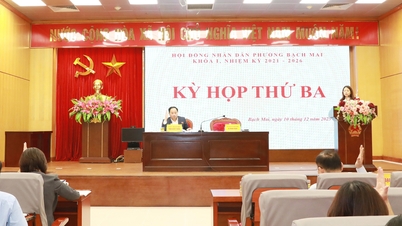
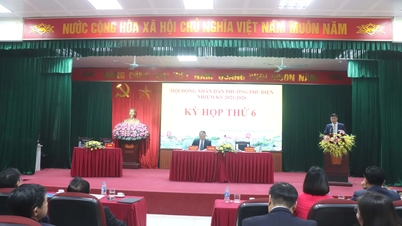
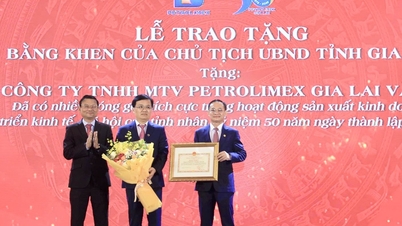
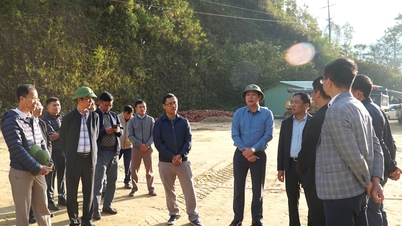
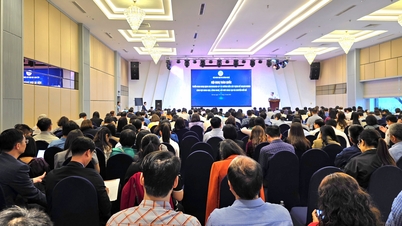





![[Video] The craft of making Dong Ho folk paintings has been inscribed by UNESCO on the List of Crafts in Need of Urgent Safeguarding.](https://vphoto.vietnam.vn/thumb/402x226/vietnam/resource/IMAGE/2025/12/10/1765350246533_tranh-dong-ho-734-jpg.webp)































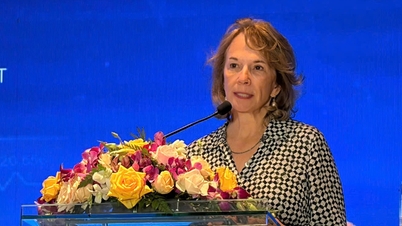


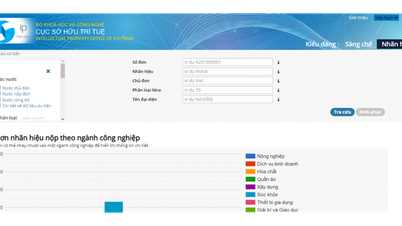
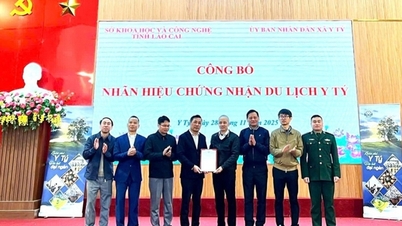
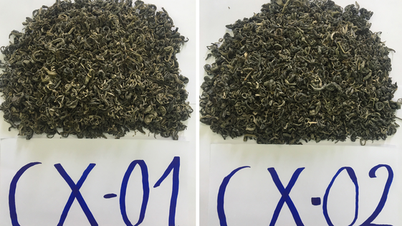

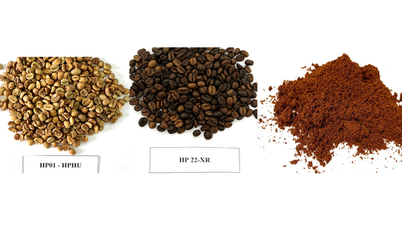







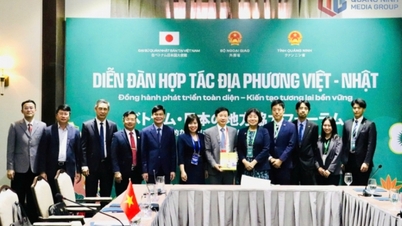



















Comment (0)